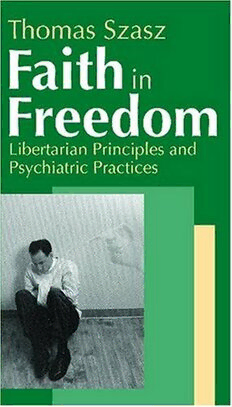
Faith in Freedom: Libertarian Principles and Psychiatric Practices PDF
270 Pages·2004·9.412 MB·English
Most books are stored in the elastic cloud where traffic is expensive. For this reason, we have a limit on daily download.
Preview Faith in Freedom: Libertarian Principles and Psychiatric Practices
Description:
"Szasz provides biting profiles of leading libertarian figures and what they've said about psychiatry. Ignorance, haziness, omission, and inconsistency are exposed--Hayek's work on theoretical psychology is "a monumental mistake." Szasz's consternation is justified and cause for concern that even libertarians think of some as less equal than others."-- Daniel Klein, Associate Professor of Economics, Santa Clara University "Szasz's book is superb. I am amazed that he has kept his humor and good sense after half a century making the argument that freedom, after all, is best. A less sane person would long since have abandoned reason and evidence. Szasz makes a devastating logical and factual case against what he calls the new slavery. As someone who has in a small way experienced the slavery, I can appreciate his advocacy of voluntary psychiatry. He has written a literate, sophisticated brief for what Adam Smith called "the simple and obvious system of natural liberty" applied to the one area of modern life in which our liberties are still eroding--psychiatry. As was famously said, when they came for the Jews, I did nothing, because I wasn't a Jew. And so forth, to: When they came for the gender crossers, I did nothing, because I wasn't a gender crosser. When they came for me, Szasz warns, there was no one left to do anything."--Deirdre McCloskey, Distinguished Professor of Economics, History, English, and Communication, University of Illinois at Chicago and author of Crossing: A Memoir The libertarian philosophy of freedom is characterized by two fundamental beliefs: self-ownership is a basic right, and initiating violence is a fundamental wrong. Psychiatric practice violates both of these beliefs. It is based on the assumptions that self-ownership--epitomized by suicide--is a medical wrong, and that initiating violence against persons called "mental patients" is a medical right. Thomas Szasz raises fundamental questions about these assumptions. Are self-medication and self-determined death exercises of rightful self-ownership, or manifestations of serious mental diseases? Does deprivation of human liberty under psychiatric auspices constitute odious preventive detention, or is it therapeutically justified hospitalization? Should forced psychiatric drugging be interpreted as assault and battery on the person, or is it medical treatment? The ethical standards of psychiatric practice mandate that psychiatrists coerce certain innocent persons. Abstaining from such "intervention" is considered malpractice--dereliction of the psychiatrists' "duty to protect." This duty reflects the fact that psychiatry is an arm of the coercive apparatus of the state, converting it to an institution Thomas Szasz calls "psychiatric slavery." How should friends of freedom--especially libertarians--deal with the conflict between elementary libertarian principles and prevailing psychiatric practices? In Faith in Freedom: Libertarian Principles and Psychiatric Practices, Szasz addresses this question. After examining the theoretical underpinnings of the problem, with precision, he presents several analytical studies. Expanding on ideas first developed in the groundbreaking and controversial works The Myth of Mental Illness, Ceremonial Chemistry, and Liberation by Oppression, Faith in Freedom is a strikingly original book, written by one of the foremost champions of psychiatric freedom. It will be of lasting interest to psychiatrists, sociologists, mental health practitioners, and students of political science. "[Faith in Freedom] is a strikingly original book, written by one of the foremost champions of psychiatric freedom." -SirReadaLot.org Thomas Szasz is professor of psychiatry emeritus at the State University of New York Upstate Medical University in Syracuse, New York and adjunct scholar at the Cato Institute, Washington, D.C. He is the author of A Lexicon of Lunacy, Liberation by Oppression, and Words to the Wise, all available from Transaction.
See more
The list of books you might like
Most books are stored in the elastic cloud where traffic is expensive. For this reason, we have a limit on daily download.
